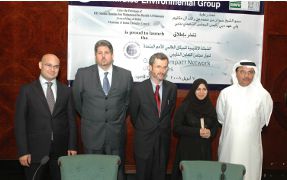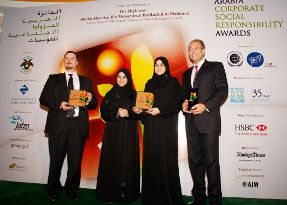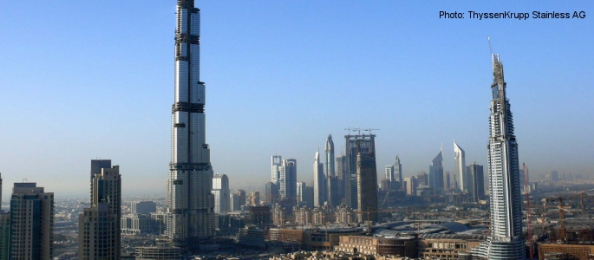The Global Compact in the Emirates
In just 20 years, the countries of the Gulf Cooperation Council (GCC) have transformed themselves from deeply traditional nations that depended largely on oil revenues to booming metropolises with rapidly growing and diversified economies. The transformation – especially in the United Arab Emirates (UAE) has been staggering; once home to a small and tight knit society, the UAE today boasts over 202 different nationalities, making it one of the most diverse nations in the world. The rapid development of the region is accompanied by a greater call for a more responsible and sustainable way of doing business, in order to solidify the progress that is being made.
The UN Global Compact is gaining momentum all over the world and the Gulf Region is no exception to this trend. One of the world’s fastest-growing regions in terms of economy as well as demographically, the Gulf Region presents the UN Global Compact with a unique opportunity to make a firm and lasting impact on the way that business is conducted in this part of the world. As the UN Global Compact Local Network focal point for the GCC states, the Emirates Environmental Group has been actively engaging local and regional businesses, government, and semi-government organizations since 2007.
The state of CSR in the GCC States
“We have to face facts; advanced industrialized countries must accept the majority of responsibility for cleaning up the environment. Some developed countries do not want to take responsibility under the pretext that it would undermine the progress of their country and affect the welfare of their society. This is both unfair and selfish.”
Sheikh Mohammed bin Rashid al Maktoum, Vice President and Prime Minister of the UAE and Ruler of Dubai
The Gulf Cooperation Council is made up by Saudi Arabia, the United Arab Emirates, Qatar, Oman, Bahrain, and Kuwait. This oil-rich region has seen tremendous growth in the last 20 years, with the focus – especially in countries like the UAE – shifting from being almost exclusively reliant on oil-export revenues to becoming far more diversified economies.
As a result of this diversification, the region has witnessed an enormous influx of foreign capital, companies, and labour. This has had a significant effect on the social and environmental make-up of the countries in the GCC and has posed serious questions with regard to a wide variety of issues, ranging from the national identity of the local populations to the growing environmental footprint of the GCC.
Certain aspects of Corporate Social Responsibility (CSR) have a long history in this region (philanthropy is one of the five pillars of Islam), but until recently, CSR as a comprehensive, long-term business model was largely unknown in the GCC. Although national governments have been quick to recognize the environmental implications of the massive growth of their economies, and have taken innovative steps to reverse this trend (Masdar City, the world’s first Carbon Neutral city in the Emirate of Abu Dhabi is one particularly notable example), there are other areas where legislation is lagging behind the fast-paced developments on the ground.
Emirates Environmental Group (EEG) has been playing a central role in convincing businesses and the general public that it is imperative that both local and international companies step up and – voluntarily – take up the responsibility of doing more than is minimally required of them.
Increasingly, companies in the GCC are realizing that there is more to Corporate Social Responsibility than just PR value, and they are starting to incorporate CSR principles into the core values of their businesses. As is to be expected of dynamic and varied economies, the CSR initiatives being undertaken by GCC businesses vary greatly in scale, quality, and sustainability. Nevertheless, the enthusiasm with which the UN Global Compact has been received by companies, government, and semi-government organizations in the GCC proves that there is great potential to achieve truly sustainable growth.
The UN Global Compact Local Network in the GCC states

Photo: Global Compact Network Gulf Region
Two years of diligent preparation, raising awareness of the UNGC in the GCC states, and developing a local framework culminated in the official launch of the UNGC Local Network for the GCC states on April 7, 2008. The festive occasion brought high-level representatives from government, semi-government and the private sector together for the official ceremony. The event even received the patronage of the Crown Prince and chairman of the Executive Council of Dubai, HRH Prince Hamdan bin Mohammed bin Rashid al Maktoum, underlining the support that the UNGC enjoys in the highest levels of government.
The UNGC executive director, Mr. Georg Kell, provided the keynote speech, while other speakers included Mrs. Habiba al Marashi, and Steering Committee members Mr. Mohammed Al Sarhan and Mr. Rami Ghandour. In addition to the 17 companies that had already signed up before the official launch, another organization joined the UNGC Local Network at this event. The high-level guests and impressive media turnout gave the launch excellent media coverage and subsequently helped further raise the profile of the UNGC Local Network with the general public.
The UNGC Local Network structure
The Emirates Environmental Group acts as the focal point for the UNGC Local Network. The EEG’s chairperson, Mrs. Habiba Al Marashi, sits on the UN Global Compact board. The diversity of the GCC is perfectly exemplified in the UNGC Local Network for the GCC Secretariat office, where people from 12 different countries work together to advance the principles of the UNGC in the GCC.
Although the secretariat of the Local Network is based in Dubai, UAE, the Network aims to actively involve participants from all GCC states. Reflecting this aim, the steering committee for the Local Network consists of participants from the UAE, Qatar, and Saudi Arabia. The goal is to further expand this Steering Committee, so that its members truly reflect all countries of the GCC. Ideally, each country will be represented by both a member of a government entity and a representative from the corporate world. The current members of the Steering Committee aim to convene at least three times a year, with the location of the meeting rotating between them.
The UNGC Local Network’s activities
The UNGC Local Network has been off to a flying start. Introducing the UNGC in the region that was largely unfamiliar with the Initiative and its principles, we initially set out to raise awareness among our existing members and the general public. Support has been steadily growing and we consequently rolled out a number of lectures, workshops, and documentation to further familiarize organizations in the region with the UNGC.
We also provide our participants with access to CSR experts and resource speakers to further strengthen their own CSR practices. The Local Network has represented the UNGC at three international forums; the First Alliance of Civilizations Annual Forum (Madrid, January 15–16, 2008), the Second Forum of Ministers for Social Development (Amman, November 12–14, 2008), and the Business for the Environment Global Summit (Singapore April 22–23, 2008).
In addition to officially representing the UNGC at high-level events, we have committed ourselves to lobby for greater UNGC participation whenever the (speaking) opportunity arises. Perfect examples of such opportunities were the International Business Forum
(Doha, November 28, 2008) and the CSR networking event hosted by the Dubai Chamber of Commerce, where the EEG chairperson, in the capacity as guest speaker, encouraged businesses to join the UNGC.
In addition to public speaking engagements, the Local Network Steering Committee convened twice in the past year. The Local Network was also represented at the UNGC board meeting, with Mrs. Al Marashi present in New York (April 30–May 1, 2008).
UNGC Local Network participants
The UNGC Local Network for the GCC states was launched under the patronage of Sheikh Hamdan bin Mohammed bin Rashid Al Maktoum, Dubai’s Crown Prince and the chairman of the Executive Council. His involvement with the UNGC Local Network and with its launch has been extremely beneficial to the Network in terms of credibility and publicity. In this region, having the government’s seal of approval is crucial to engaging key players in society, and the Crown Prince’s patronage has proven to be very helpful in this process.
The UNGC Local Network currently has 34 active participants spread out over five GCC states, while the applications for two more memberships are currently being processed. The participants are heterogeneous, with MNC’s, SME’s, and local companies all participating. Reflecting the GCC’s economy, the majority of participants are Construction and Engineering companies, with the Professional and Scientific and Oil&Gas enterprises coming in second and third place, respectively.
As a relatively young Local Network, the UNGC Local Network for the GCC set out with a dual policy: to actively recruit new participants to the UNGC and to engage those businesses that had already signed up globally to become active participants locally. In this it has largely been successful. Businesses across the region are becoming more aware of the benefits of participating in a Local Network, and the Local Network focal point, in turn, has been stepping up its efforts to actively engage its Local Network participants. This too has paid off. UNGC global initiatives such as the CEO Water Mandate, the Caring for Climate statement, the CEO statement on the UN Convention against Corruption, and the CEO statement on Business and Human Rights were all endorsed by businesses from the GCC. In addition to these initiatives, one of the GCC Local Network participants became the first business from the Middle East to donate to the UN Central Emergency Response Fund (CERF) by answering the Secretary General’s call to donate to the Gaza Relief Fund.
Among the participants of the UNGC Local Network for the GCC, there are varying motivations for joining the Network. In a participant survey held in 2008, respondents cited the desire to build knowledge and capacity for CSR as their top reason for joining the UNGC. Improving stakeholder relationships and building trust came in as a close second. The fact that companies cite these objectives as being more important than just networking opportunities and PR value is a clear sign that the long-term value of responsible business is sinking in with companies in the region.
The UNGC and CSR in the current financial climate

Photo: Global Compact Network Gulf Region
The greatest challenge that we currently face is convincing businesses in the GCC region that the current financial crisis should not be an excuse to downsize their CSR efforts. An unfortunate side effect of the fact that CSR is relatively new in this region is that its position as an integral business component has not yet been completely solidified in many businesses. In the wave of company downsizing that has also affected the GCC, departments dealing with CSR issues have been among the hardest hit. The UNGC Local Network for the GCC is acutely aware of these developments and is actively reaching out to existing and potential participants to try and reverse this trend.
The Network’s first workshop of 2009 was focussed on doing “Sustainable Business in the Current Economic Climate”. Featuring prominent guest speakers from the public and the private sectors, the workshop underlined the importance of sound CSR practices in this economic climate. According to the Director of Sustainability for Deloitte, “Corporate responsibility and Sustainability are an imperative, because those companies that fail to address CSR will find themselves on the path to corporate extinction.” His strong message was echoed by the CSR manager of the Dubai Chamber of Commerce and Industry, who told the audience that “Environmental challenges like global warming will not go away. They will intensify, causing an array of social challenges too.” Both speakers proceeded to present the audience with an outline of practical steps that can be taken to ensure responsible and sustainable business practices in the current climate.
As the UNGC Local Network for the GCC focal point, we consider it to be our responsibility to continue to spread the message of the importance of CSR, especially in this current climate. Issues such as transparency, responsible investment, and managing human capital are now more pressing than ever, and communicating this to government, semi- government, and private organizations across the region is our top priority in these trying times.
Conclusion
The GCC has successfully transformed itself into a global financial hub, with the UAE standing out as a shining example of a modern, open, and progressive Arab nation. Several progressive leaders of the countries in the Gulf have been lavished with praise and admiration for their visionary approaches to the development of their countries. The people of the GCC are rightfully proud of the immense leaps that they have taken in such an incredibly short time. It is, however, too soon to sit back and rest on our laurels. With the privileges of development also come the responsibilities. As His Highness Sheikh Mohammed said: “It would be both unfair and selfish to sit back and let others deal with our shared responsibility towards the environment and the society that we all live in.”
At the EEG, we work towards yet another transformation of the GCC – from capital-driven development to a fully inclusive and sustainable society that honours its rich heritage while leading the way towards an equitable and responsible future for all who call this region home.
The Emirates Environmental Group (EEG)
The Emirates Environmental Group (EEG) has been active since 1991. Based in Dubai, UAE, the EEG was founded with an aim to create a more sustainable and equitable society in the UAE and the wider GCC region. As the name suggests, the EEG initially focussed mainly on environmental issues in the rapidly expanding UAE. In a country where civil society was virtually non-existent, the EEG quickly became the torchbearer for a wide variety of environmental initiatives.
In partnership with its corporate members, several long-running and highly successful campaigns have been rolled out, including the Can Collection Drive (under the slogan YES WE CAN!, the EEG encourages schools, businesses, and individuals to collect and donate their empty aluminium cans at several can collection points). The glass, battery, toner, and paper collection campaigns have proven very successful and continue to attract more participants with each cycle. Furthermore, the EEG regularly teams up with businesses to organize Waste Management Outreach projects, which promote recycling with a wide variety of groups.
Perhaps one of the most challenging, yet rewarding initiatives has been the “Clean up the UAE 2008” campaign, which featured more than 23,000 volunteers cleaning up 140.5 tonnes of litter all over the UAE. This massive campaign, which was coordinated by the EEG, featured mainly students as volunteers and offered them a revealing glimpse into what happens to our surroundings when we do not take care of it.
In addition to educational campaigns, the EEG has a long-standing tradition of honouring the people and organizations that prove to be champions of change. Each year, the EEG honours those who have made exceptional contributions to environmental protection during a very high-profile gala dinner.
The EEG has always maintained that protecting the environment cannot happen in isolation. Environmental responsibility is an integral part of a wider set of social and economic issues that the UAE and the rest of the GCC are faced with. Capitalizing on the solid relationship with government, semi-government, and businesses in the GCC, the EEG CSR Network was launched on March 15, 2004.
Taking the relationship between the EEG and its partners to another level, the EEG CSR Network offers participants a tool for facilitating open and transparent business policies and practices based on ethical values that have a sustained, positive impact on business, the environment, and society as a whole. The EEG CSR Network has proven to be an excellent platform for networking, sharing best practices, and learning among the corporate leaders in the GCC. Here, too, a host of activities have taken place, ranging from community lectures, workshops, training sessions, and the highlight of the year: The Arabia CSR Awards. Launched by the EEG CSR Network, the awards honour small, medium, and large businesses across the GCC and the wider Arab world that have made an exceptional contribution towards sustainable development through their CSR programs.
Environmental sustainability, then and now
After years of fast-paced growth of both the economy and the ecological footprint of the UAE, the government has wholeheartedly embraced environmental protection.
Masdar City was mentioned earlier as a notable example in Abu Dhabi. Dubai’s Green Initiative ensures that all new buildings adhere to strict guidelines when it comes to sustainable materials and building methods. These groundbreaking initiatives build on the strength of the UAE as a relatively new country that has the opportunity, will, and capacity to lead when it comes to environmental sustainability.
With leadership that has put its weight behind the quest for a more sustainable society, the challenge of fully engaging all sectors of society remains. The UAE and, to a lesser degree, the wider GCC states have become transient societies. The large foreign labour force that has descended on the region generally only call it home for a limited number of years, making them less attached to their environment and less inclined to care for it properly. The EEG has been combating this “But this isn’t my home anyway” attitude since its inception, and will continue to do so. Fortunately, we are witnessing a gradual shift in the level of awareness and commitment to work towards a more sustainable society.
Habiba Al Marashi is Chair of the Emirates Environmental Group (EEG) and Board Member of the United Nations Global Compact
About Us // Privacy Policy // Copyright Information // Legal Disclaimer // Contact
Copyright © 2012-2018 macondo publishing GmbH. All rights reserved.
The CSR Academy is an independent learning platform of the macondo publishing group.









